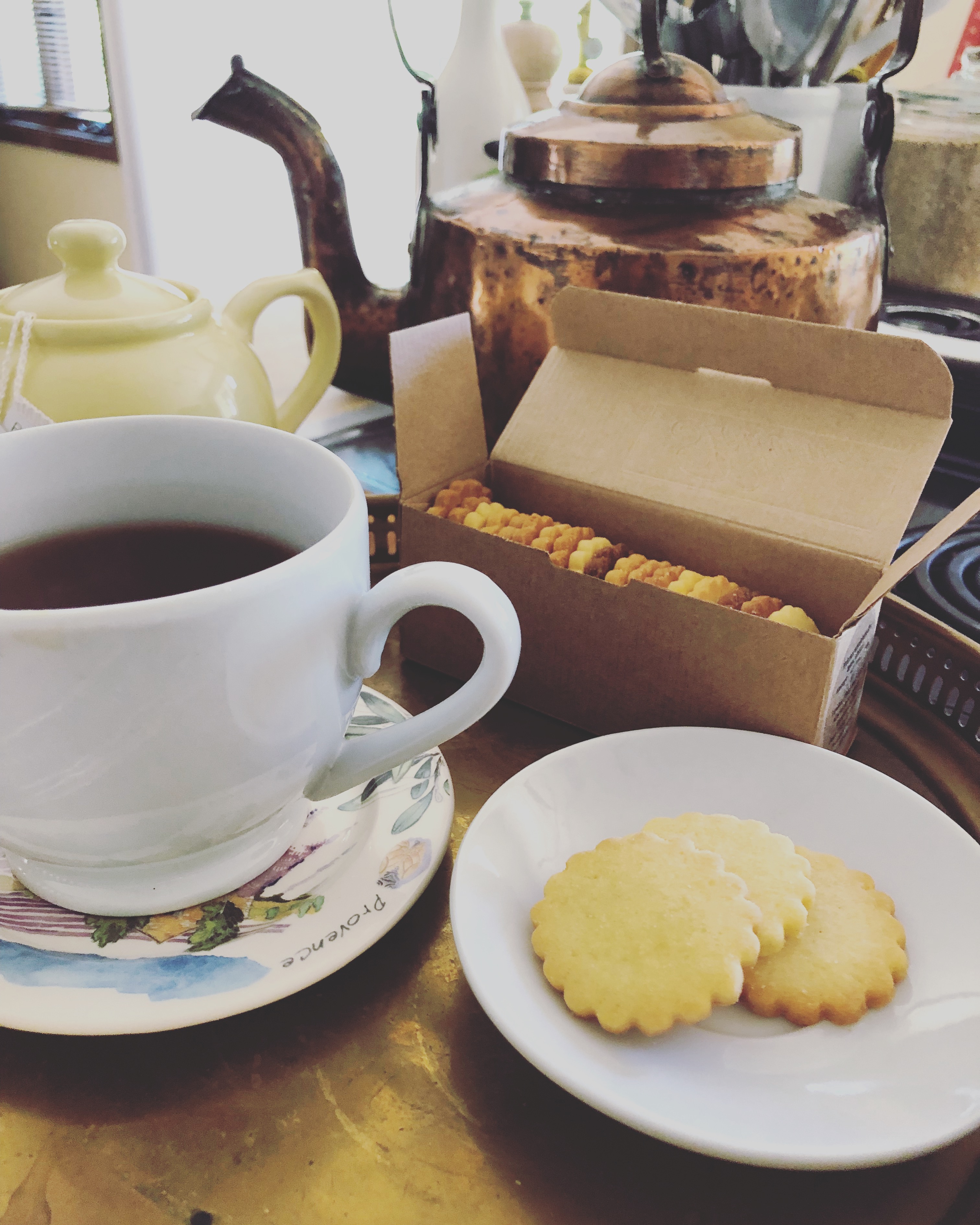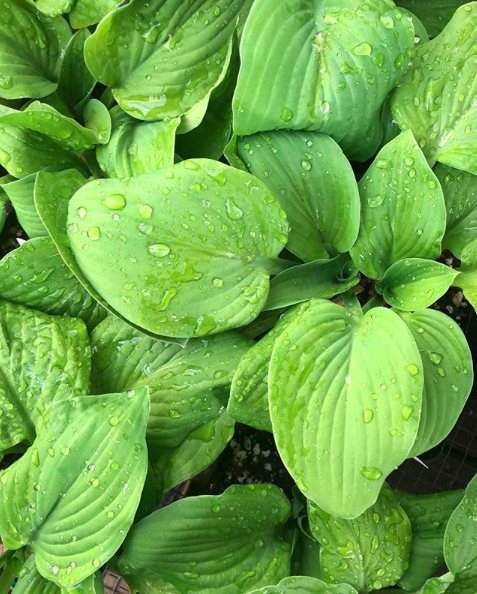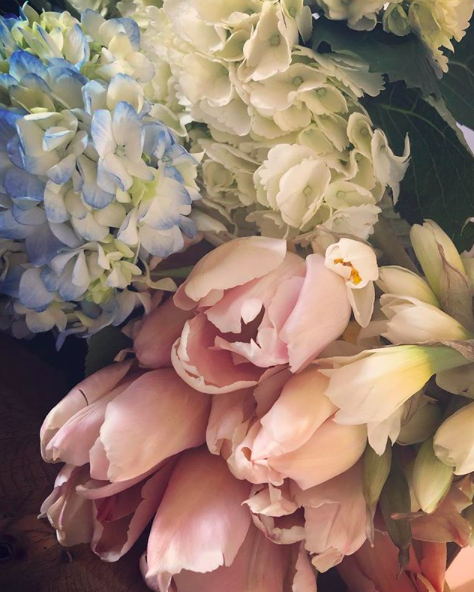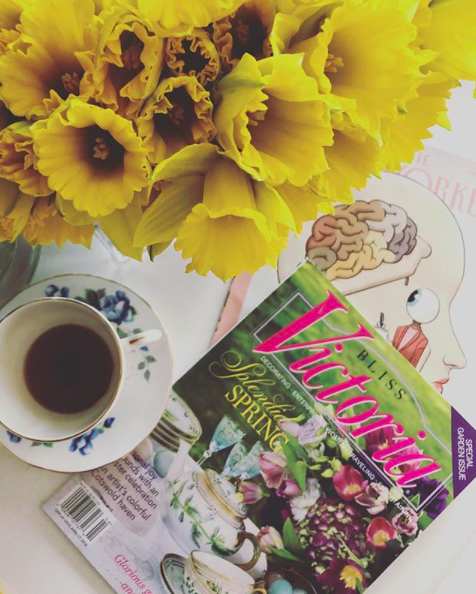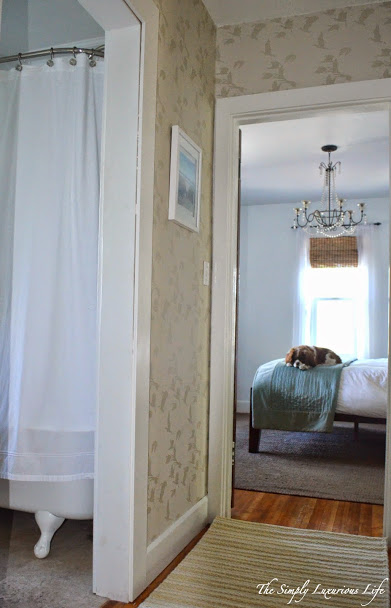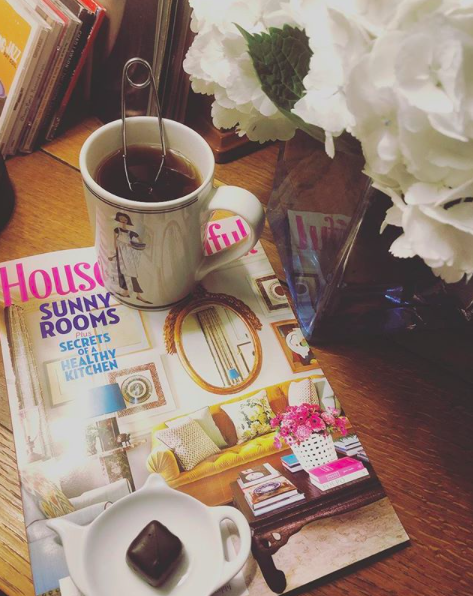Sun, 2 September 2018
 "One of the greatest challenges we all face is to find a happy balance between the opportunities that are available to us, the media-implanted urge to have them all, and our own desire to keep focused on the things that really matter." —Elaine St. James in Living The Simple Life: A Guide to Scaling Down and Enjoying More Momentum is a powerful source of energy, and even though I am far from being a physicist, I understand the basic concept that since all objects have mass, and if an object is moving, it will have momentum, thus power/energy. We are objects of energy when we keep our schedules and lives running. Whatever pace you are moving at currently, if it is a pace you have become accustomed to for some time, it is easier to keep moving along at this pace than it is to slow down, even to speed up. As we begin Season 5 of the The Simple Sophisticate podcast today (check out the full schedule of episodes here), many of us are stepping back into a full schedule, or at least one slightly different from the previous season. Whether it is simply a busier schedule due to clients and staff returning from their holidays, or perhaps you as well, the pace tends to pick up, and if we aren't careful or conscious, we can move along with this energy without realizing that it may not work well for the balance we know is best. Now, granted, the pace you are stepping back into may be something you relish and works well; in this case, savor it, but simply be conscious of the energy that rolls forward and is easy to become swept up in without our being aware. If, however, the pace that fall (or the new season) brings is something you wish to shift, to improve, I have some ideas about how to instill a new pace of momentum that works best for your life. For the third time I read Elaine St. James' Living the Simple Life (1996), and it was upon reading it this summer that a few ideas she shared jumped out at me that had not previously. Most predominantly, taking a full month to live your life differently as a way to assess what you really need and determine what is helpful and what is actually hindering the quality of your life. As I read this, I recognized my own experience having had the opportunity to travel in France for an entire month this summer. During this time, as I shared in a couple of blog posts (Doubt the Default: How My Trip to France Woke Me Up, episode #218 and Why Not . . . Let Your Brain Calm Down?), the clarity I gained about what was helping and was was obstructing the quality of my life was illuminated. But upon reflection, it was the duration of the trip that enabled this to be more readily recognizable. Partly, this was because after spending four weeks in another culture, you are more acclimated than you realize, and so upon returning, there is an element of shock to your system (at least there was for me due to my fondness for the French culture). However, I am confident that we do not need to 'get away' to another country to have the same experience. As a teacher, each summer I feel I am given this opportunity to reassess what is working and what isn't, but it is my choice to reflect and then put into place the changes I realize would be beneficial. So here's the challenge and the opportunity - for one entire month, make one, some or all of the following changes to your lifestyle as inspired by Elaine St. James and my own experience and observations to free up more time in your life to do what you love or do nothing at all, simple to relax, sleep more, dream more, savor time with loved ones more, simply live as you please. With the month's conclusion, take an hour or a morning or an afternoon and reassess to see what differences (positive or negative) you experienced.
Initially this list may seem impossible, but remember, it is only for one month, AND choose what piques your interest. Again, remind yourself as you begin the month with anything that may be difficult, It is only for one month. For one month I didn't watch the news, and by doing this, it made it far simpler to return to the states and not turn it on at home. As I mentioned last week, how I have adjusted is to watch the NBR (Nightly Business Report) and read a daily brief each morning. Anything else is quite jarring to me, far more than I recognized prior to my trip. The key for the changes you seek to become more comfortable is to give yourself this one month of practice or living or doing without. This is where momentum comes into play. It is very hard to shift gears as behaviors become habituated, even behaviors that are not helpful. And so when we initially begin to change the habit or behavior, we think the difficulty is due to it not being what is best. However, in truth, it is simple science - anything new, any shift of energy is slow and awkward until it gets going at a good and steady pace. Give yourself the full month to make the shift and redirect your momentum. When we discover that the blue sky was deeply blue today, far more than it was last week, we realize the pace we had been living previously was not allowing us the ability to be present, to observe and to appreciate. Such appreciation is part of improving the quality of our lives. And when we return after the month we challenged ourselves to above and begin to watch some television for example, we do so more discerningly, more thoughtfully, as we now recognize that indeed what we watch indirectly affects our emotions. May in one month's time, you have more free time and therefore a life of increased quality. ~SIMILAR POSTS/EPISODES FROM THE ARCHIVES YOU MIGHT ENJOY:
~Learn more and sign up for TSLL's Weekly Newsletter. ~TSLL Fall Shopping Guide 2018 was just released this past weekend. ~Saturday September 8th - The Simply Luxurious Kitchen vodcast debuts its first season! Petit Plaisir:~The Guernsey Literary and Potato Peel Pie Society film on Netflix
 https://youtu.be/vP9eDmX0ow0 Sponsors of Today's Episode:
~The Simple Sophisticate, episode #224
|
Sun, 19 August 2018
“The French have a special word for it, La Rentrée; in English it is simply referred to as ‘Back to school’. However we choose to call the September post-vacation return, and no matter how far our schooldays are behind us, few would deny that this really is the moment in the year that shouts ‘new beginnings’, ushering in a renewed sense of resolve and purpose that has far more potency than any January resolution. As grown-ups, the brand new pencil case and shiny new pair of school shoes that signal a fresh start are replaced by the new-season updates that we hope will deliver so much more than just the latest look: the confidence-boosting coat, that uplifting new shade of lipstick . . . But it really is the change of attitude that matters most, the yearning to be smarter, more balanced – in short, the eternal quest to finally get life ‘right’.” – Lucy Yeomans, editor-in-chief Porter magazine
The attitude we approach anything with undeniably plays a role in how successful the endeavor we are embarking on will play out, and while here in the states businesses don’t shut down entirely for the month of August or July as well sometimes as they do in France, when Labor Day travel winds down, there is a shift in everyday routines, expectations at work and at school, and a mental shift is expected to occur.
The French expression “À la rentrée” is loosely translated to “See you in the fall!” (literally translated to “at the return”), but it is understood September is the date at which all will return – from their extended vacations, from their respite from school, from everyday expectations and regular activity that occurs the other 10 or 11 months out of the year.
Studies have shown, repeatedly that taking the time to literally get away from work, putting down the technology and truly being on vacation can have highly beneficial effects on the brain. When we allow our brains to rest and think freely – problems magically seem to have solutions, creative ideas spring up like daffodils in early spring and we are renewed and reenergized.
So no wonder the French celebrate the return from their vacations. September and thereafter offers an opportunity to put our best self forward, to, as the quote above states, ‘finally get it right’. And while nothing will ever be perfect, improving and fine-tuning will always continue to bring different results than if we did the same thing over and over again.
Over the past handful of years, I have written posts to help ensure a strong fall. With one short list here, and another short list there, some of them shared a few similarities, while also offering new ideas. However, none of them have been a podcast episode, and now I have a few more items I would like to add. So today, I’ve made a list of 23 ways we can all welcome the beginning of fall (or spring for my southern hemisphere readers!) with optimism, hope and the best possible path too living a more balanced and enjoyable everyday life. This is the actual list I look at each year (and as I mentioned, it is tweaked and improved each year as my life evolves), and I have organized into arenas of our lives: health, wardrobe, beauty, organization, sanctuary, and regular balance/tranquility. In some arenas, things may be moving along quite well, but perhaps in others we know we could improve. Home in on where areas you want to improve, and take a day, or a few hours in a quiet, relaxing setting to curate a life that excites you to wake up to each day.
Overall Health (physical & mental - peace of mind included)
1. Ask yourself this question, “What has made my life more enjoyable these past 2-3 months?” or “What routines/habits have made my life easier, healthier and brought more contentment these past 2-3 months?”
Often when our schedule changes with the summer months, we unconsciously change our ways of living, ways that we love (or not so much as it will depend upon the individual). However, I have a feeling, you have a few habits that you will miss when the fall season begins. Ask yourself, and be honest, is there any way you can bring them into your year-round routine? Can or should you shift your priorities if it indeed is bringing so much joy and satisfaction into your life? Remember, simply because we used to do something one way or do something at all, doesn’t mean we cannot stop and incorporate something more fulfilling. In fact, we should.
2. Create a default capsule weekly menu & establish a food shopping plan. ~Learn more about TSLL's seasonal capsule menus here (summer will be posted this Wednesday - August 22).
As I was taking my lunch break today, I was reminded that I needed to restock my favorite balsamic vinegar which reminded me that having our épicerie stocked and ready for whatever meal we’d prefer to cook is a simple thing to do now to enhance the seamless flow of a day that has little time to wiggle. Here is a post to remind you of the necessities to have on hand.
4. Plan a regular fitness routine that works with your daily work/school demands. Be honest with yourself about what you can achieve. You don’t want to burn out and quit altogether. Remember it is consistency that will make the difference. So choose activities that blend enjoyment with challenge.
5. Balance your budget and know where you stand financially. Due to your schedule potentially changing, financial expectations may change as well, so know exactly where you are and how much you can spend. 6. Make appointments now Just as our schedules change, so do the schedules of our doctors, dentists, aestheticians and other professionals we wish to make appointments with. While their schedules may have been more limited, but as well, with more availability during the summer months, often that changes in the fall. So why not be proactive, and design your schedule with what works best for you by making those appointments early?
Optimal Organization
7. Clean your home/office/bedroom/car thoroughly. It will simply make you feel better when you enter each and every time.
8. Purchase any necessary supplies for your office, desk and planner
9. Spruce up and stock up your handbag
Whether you have found your favorite go-to day handbag, take a few minutes, to clean out, and then restock for the new season. Chapstick, Tide-to-Go, hand lotion, breath mints, a favorite pen, anything to get you through your day – stock it up, and then toss the rest so that it is neat and tidy.
Wardrobe
10. Assess your wardrobe
On Saturday September 1st TSLL Fall Seasonal Shopping Guide will be posted here on the blog (no longer do you need to subscribe to receive it!). Full of splurge and save items when it comes to the new trends as well as many items I have hand-picked for your fall capsule wardrobe, knowing exactly what you need makes the shopping easier and brings fewer regrets. (Have a look at the 2018 Spring Shopping Guide here.)
~Shop TSLL Capsule Wardrobe Boutique here to view the essentials for each season.
11. Take anything to the dry-cleaners that you’ll be wearing for fall (coats, tops, dresses, skirts, sweaters, etc)
Beauty
12. Stock up make-up supplies that are running low. Visit your make-up counter for make-up to try out the new fall products. ~Why Not . . . Automate It? 12 Ways to Improve the Everyday
13. Confirm and/or schedule your regular hair appointment
14. Plan/Schedule Beauty Routines and/or appointments. From the beauty routines you can do at home - pedicures and manicures, to the seasonal facials at your local spa to not only give yourself a luxurious hour or so to relax, but also help your skin, tend to these appointments is a way to feel and look your best, but also find a balance in your everyday routine.
Creating Regular Balance & Tranquility
15. Stock up or put together a home pampering kit (bubble bath, truffles, wine, candles, music, etc). There will be days when your heels are ready to be taken off, your mind is a jumble and emotional stamina has been exhausted. Be prepared in advance and have what you need to relax stocked and ready to go.
16. Do you have a travel coffee mug or water bottle that works? For only $15 make sure you have a reliable mug that you can take with you to meetings, lectures, on the commute to help you get your day started off right.
17. Create a morning routine to look forward to and set the right tone for the entire day. ~11 Ways to Start the Day 'Smart'
18. Create a bedtime ritual
The amount of sleep we receive each night is a strong determiner in the day we will have, so be cognizant to the small details that you have control over. You might be surprised of the significant benefits you will reap each evening when you turn in. A few things to try: remove the television and all technology (especially your phone), light a soothing scented candle (lavender, chamomile, bergamot, jasmine, or sandalwood) – this is my favorite as it has a fantastic scent and lasts for 60 hours, write in a gratitude journal to end your day on a positive note, meditate (find out how & why here), or read a book.
19. Order or Check-Out/Put on Hold Reading Material to Enjoy
I can’t wait for the time to snuggle in when it’s raining out or I’ve wrapped up my to-do list, and dive in. A true simple luxury. And since now I have the time to peruse and put them on my wish list, I can rest-assured I will always have reading material to enjoy.
20. Pick up a journal
As I mentioned above, the daily ritual of writing in a gratitude journal is a simple idea to end the day on a positive note. And even if you’ve had one of those days, there really are things to be grateful for – check this list if you find yourself at a loss for what to write down. Simply taking note of positive events (or non-events – the car didn’t break down!), can be a wonderful reminder that things are going better than we might have first thought.
Create a welcoming sanctuary
21. Visit your local nursery Fall plants will begin appearing at nurseries to finish the blooming season – check out mums, daisies and sunflowers. Add a few to your porch or vases throughout the house.
22. Look closely at your home's decor Perhaps you traveled this summer, or maybe you attended a course in which you saw personal growth and a shift in what you value and/or love. Welcome in who you now, let go of what no longer inspires you, and create a space that best reflects you and welcomes you home as well as you guests.
Putting It All Together
23. Set your intention
Often when a yoga class begins, one of the reminders at the beginning of our session is to set our intention – what do we wish to receive or achieve by attending class – do we want to push ourselves further, do we simply just want to make it through class, do we want to be more aware of staying focused and letting go of outside thoughts – whatever our intention is, it is ours. So what will your intention be for the fall season and beyond?
Choose one, write it down and reflect upon it from time to time. Create daily rituals and habits that help this intention become your reality. I think you will be surprised that what you focus on, you are more likely to create – much like the attitude we bring to any new venture or beginning. If we’re excited, that excitement spreads and invigorates, but if we’re leery or cynical, moments of wonder are less likely to be enjoyed and discovered.
Wishing you a lovely start to a beautiful new season, and thank you for stopping by.
~PODCAST NEWS: Season 5 will begin on Monday September 3rd, and the new schedule for Season 5 will be shared right here on the blog on Monday August 27th in lieu of a podcast episode. Don't worry, there will always be a motivating post to kick off your work week - right here on TSLL blog. I will explain the entire schedule (there will be 30 new episodes in the coming 12 months) and share specific dates when episodes will air. Looking forward to another season and so tickled we have had such an amazing four years!
SIMILAR POSTS/EPISODES FROM THE ARCHIVES YOU MIGHT ENJOY:
~11 Ways to Start Your Day "Smart"
~Why Not . . . Gradually Prep for La Rentrée?
~The Importance of a Daily Routine & How to Create One You Love, episode #164
Petit Plaisir:
Mini Portable Chargers
~The Simple Sophisticate, episode #223
|
Sun, 29 July 2018
~The Simple Sophisticate, episode #219~Subscribe to The Simple Sophisticate: iTunes | Stitcher | iHeartRadio | YouTube | Spotify |
Sun, 22 July 2018
~The Simple Sophisticate, episode #218~Subscribe to The Simple Sophisticate: iTunes | Stitcher | iHeartRadio | YouTube | Spotify
“A nail is driven out by another nail; habit is overcome by habit.” ― ErasmusWhile traveling during the past four weeks in France, I found that I was finally able to default in conversation to a handful of expressions to, on the most basic level, demonstrate I comprehended what was being said - bien sur, absolutement, parfait, ouai, je comprends, merci, de rein, à demain. Again, as you can see, a very basic level. But, there was no longer a pause before I spoke whenever any of these words or phrases was warranted. My mind no longer had to think, I just spoke. In this instance, I was tickled. Finally, an aspect of the French language, after many years of sporadic studying, was becoming a default in my brain. A muscle had been strengthened to the point of habit. But, again, my responses were basic, simple, surface. "Doubt the default." When I heard Adam Grant utter this simple, concise, alliterative statement in his TED Talk about original thinkers, my attention was captured. It happened three years ago upon arriving in Bend and moving into my new home that I ran into a new neighbor. The circumstances were we didn't know each other, simply put, and I uttered in conversation with this perfect stranger, "trust me, I understand what you mean." At the time, I didn't think about that phrase before I said it, I didn't really consider the weight of such words - "trust me", I just said it out of habit. Default. And I wouldn't have even reflected upon this fact had the woman engaging me in conversation not said, "I don't know you to trust you." The topic of our conversation was about our dogs, but the truth was, she didn't know me, and she was fully present in the conversation. While I thought I was, the words I chose said otherwise. Ever since this conversation, I have thought carefully about what I say in conversations out of habit, filler, silence-enders, space holders. I have done my best to eliminate words such as "like" from my informal speech after I recognized how many times I would say it when, had you asked me, I would have guessed the word never entered into my syntax. Aside from the words I chose, I began to dive into my living habits, my thinking patterns, and it was with my trip to France that I recognized many cultural defaults as well that I had not even considered addressing. Quickly, another word for "default" is a habit. By definition, a habit is something that frees our mind up to focus on other tasks. So as long as the habit is helpful and contributes to the quality of the life we desire, a habit is a very good thing. Selecting water as your drink of choice, looking for the positive, smiling instead of frowning, wearing the same uniform to work to eliminate wasting time in the morning - all very helpful habits. But habits, defaults, can also be hindering our ability to live a better life, a more thoughtful life, a more engaging life, especially when we don't even realize we have these unhelpful defaults. Below I'd like to share with you a list of potential defaults already in your life inspired by what I saw, experienced as well as caught myself doing without thinking. 1. Not taking a grocery tote into the marketIn France, when you go to a supermarket, they will not provide you for free with a plastic or paper bag to place your groceries. If you, as I did on my first occasion, do not bring in your canvas tote, market tote, or anything to carry your groceries, you will have to pay for their grocery bags (ones you can use on your next visit). The price was quite small - ten centimes - but it caught my attention immediately. A good habit could easily become ingrained in my memory of bringing a grocery tote to the store if I knew I would have to pay for a new bag each time I shopped throughout the week. (In one instance, I simply placed all of my groceries into my tote - handbag; and I also saw many people bringing their market baskets to the brick and mortar stores as well - multi-purpose.) 2. Expressing a negative energy during first impressionsWhen I travel, I love to listen. When I listen, I am better able to observe, and it also enables me to see more clearly, and more accurately, someone's true nature. What do I mean by this? Having had the opportunity to meet many people from all different walks of life, it was often the first impression that upon reflection was the most accurate to their true disposition. When we don't know someone, and the environment is safe, what is your first reaction when you meet them? Most of the people I met expressed warmth which made those few who did not stick out like a sore thumb. Because it is the first impression, their negative or positive energy has little or nothing to do with me, and much more to do with where they are in their life at that moment. 3. Driving faster than necessaryDriving on the roads in France, the country roads, the autoroutes and everywhere in between, it became quickly apparent that most French drivers drove the speed limit. I later had a conversation with Sharon Santoni about the laws of the road and my observation, and once she explained the drivers' point system (each Euro driver begins with 12 points and they can be lost for speeding (automatic surveillance along the roads), using a cell phone, etc.), it became clear as to why the pace of the roadways felt very civilized. No matter where in the world you drive, it would be interesting to consider the defaults you adhere to when you are behind the wheel. What is deemed acceptable, what is not? Buckling up - good. Glancing at your cell phone - bad. Driving a manual car during my entire trip which was something I am accustomed to, but my current car for the past four years here in the states is not a stick, upon arriving home, my left foot automatically began looking for the clutch without success. My brain had defaulted in four short weeks to expecting to use a clutch. This is good news. Not only can we change the defaults that are not helping us, but they can be "reprogrammed" quite quickly with frequent, repeated practice. 4. Not greeting the shop keeper, artisan, taxi driver, etc.The many travel writers and travelers of the world, have done a magnificent job of sharing the importance of saying "bonjour" if one is in France, but in nearly every other country in the world as well, upon entering any business, vendor, etc. in order to begin to set a cordial tone. From time to time, I would notice a traveler, in my case, I zoomed in on Americans, but that's not to say other world citizens don't make the same mistake as well, immediately begin making an inquiry of the proprietor without extending a salutation. And while often, the staff would attempt to help them, an opportunity to build a better rapport was missed. I began thinking about this simple habit of focusing first on the human connection before homing in on the task which brought us to the store, market, etc. The difference is there are feelings and emotions involved that must be considered when we choose to first focus on making a human connection. And when we do this, we are being present. No, we do not know how the interaction will go, but the chances that it will go well are greatly increased. 5. Assuming a market will always be openI quickly learned that I needed to plan my grocery shopping well before my stomach became hungry. While this detail was something I remembered from my previous trips, staying in vacation rentals, I usually wanted to cook my own meals, so making sure a market of some sort was open (restaurants are usually opened each day of the week for at least lunch and dinner) was a shift from my approach in the states. In the states, if I have forgotten an ingredient for dinner on a Sunday, I don't think twice about heading to the market for a quick pick up. Having to know in some capacity that I had what I needed for my meals in advance also enabled me to just relax and enjoy a leisurely Sunday or any afternoon during the week as the outdoor markets wrapped up around 1pm and most restaurants in the small towns shut down between lunch and dinner. 6. Eating the same food year roundIn Provence, the melons were nearing their peak ripeness, but green asparagus season was all but over. White beans were a treasure to be purchased and savored during these months strawberries were to indulge upon like candy. However, if I were to return in November, as most of the markets are opened year-round, I would see completely different selections. Now, we know the seasons offer different fruits and vegetables, even seafood, but it can sometimes become easy to forget when we shop in a supermarket and only stick to the same food each trip. The appreciation for the food that only comes once a year is something we can celebrate in our cooking as we dine on the rich flavors. In so doing, we actually do help our waistline as we become satiated more quickly and do not overeat as we are eating real food with natural, wonderful flavor. 7. Perfect and impersonalThe idea of a perfect home, a perfect outfit, perfect hair, a perfect life, as we know is a futile pursuit. And to this point, most intensely, it was the decor that woke me up throughout this trip as I appreciated the signature touches made available by the treasures one can find at the many brocante markets. Now this is not to say, one cannot decorate a home outside of France without the access to brocantes. Absolutely not, but what I think is tempting is to make everything look ideal immediately in our homes - paintings, furniture, tabletop vignettes, etc. And as Sharon Santoni and I were talking, a beautiful home that is the sanctuary for the inhabitants is one that has layers of unique and thoughtful decor choices, and these layers take time. When I stepped foot onto Sharon's property, enjoyed meals with her family, and stayed in her guest cottage, it was immediately clear that they lived there. I couldn't purchase her decor details", but I could be inspired by them because it was more than the things, it was the stories that came with them. 8. Speedy and surface conversationsAs I shared at the beginning of my post, it can be easy to say certain catch phrases without really thinking about what the words themselves mean. While idioms exist in every culture, sayings that mean more than what they are literally saying, it's not the idioms I am talking about here. When we are in a different culture that asks of us to reach beyond the language we are most comfortable with, often the conversation can be slow. While this may be frustrating as we want to talk quickly like locals, it shows thoughtful care. We want to make sure what we wish to say is said and not something that will offend or confuse. I find that sometimes in conversations we say more words than our necessary. Just as in every other arena of our lives, quality over quantity. When we choose our words carefully, we can say so much more. Excessive use of superlatives (best, largest, toughest, most amazing, prettiest) waters down the actual compliment if all you use are superlatives for something you either love or loathe. Precise words and thoughtful timing of when we engage in conversation, demonstrates we are listening, we care and we are trying to understand. 9. Drama is necessary and thus inevitableInitially, it was my lack of access to the regular news sources I look to or listen to on a typical day when I am in the states that made me realize that I had been accepting the noise of problems, clashes and pain as normal. But even with the shows and books we read, we can come to expect, even look for, the clash, the conflict, the drama, that must be there somewhere. The truth is, often things to work out. In fact, it is human nature biologically to remember the instances that didn't work out more readily than the times that did for survival. But when we accept this biology, we ignore that when we are aware of why this happens, we can shift our expectations, our reactions and instead rest more easy, enjoy the steady, even balance of our lives that go well quite often. Why look for the drama when it truly doesn't need to be there? 10. Assuming an incapabilityI can't travel alone. I can't drive in another country. I can't live without [insert something that you cannot travel with]. Often when we travel we discover something, if not many, things about ourselves we were not consciously aware of. Many of these discoveries are awesome, exciting bits of information that awakens us to our best selves, but sometimes we discover that we have been limiting ourselves unnecessarily. If our default in our minds is "I can't" instead of even just "I'll give it a shot" when a new task or new experience is placed in front of us, we may miss out on the most beautiful London plane trees lined country roads in France (see below), or meeting Walter Wells (I ended up after attempting to walk to class at Patricia Wells' cooking class the first night, getting lost, and ended up calling Walter who came and found me and picked me up in his car to take me to their property for dinner - we had a lovely conversation). We often sell ourselves short regarding what we are truly capable of doing, and we especially do so when our default setting is immediately "I can't". Yes, you can. You may have to do a bit more homework, save a bit more money, or have some patience, but "I can't" is often more an expression of hoping that we could so badly but we just don't know how. "Default choices often remain unchanged for no reason other than being the default, either because of this lack of information or humans' status quo bias." —Marvin Ammori Adam Grant was right, we should doubt our defaults because when we don't we are either living unconsciously or not living as full of a life as we could if only we had more information to make different choices and take different actions. Kristin Armstrong states it frankly, "We either live with intention or exist by default." When we live with intention, we are living well. We may not have success on our first attempts at speaking differently, acting differently or engaging differently, but we are doing it out of a conscious choice to live more authentically, thoughtfully and more engaged with the world we are living. While traveling to France made this concept of living with defaults quite glaring to me, we don't have to travel outside of even our own town to know that we may have defaults that are not serving us or defaults that are limiting our full potential whether it be in our appreciation of life, our relationships, even our success at work. All it takes is a choice to reflect and ponder, why do I greet people the way I do? Is that the energy I want to extend? If so, that's awesome, but if you recognize you want to make a change, you can do that too. When we doubt the default, we are choosing to be selective about the habits we allow to be habits in our lives. It's when we do not know we have these habits that we step on our own toes, so to speak, and trip ourselves up without realizing we are the ones slowing our progress down. And that is great news, we each have the skills and the opportunity to stop tripping and start striding into the life we love living. ~SIMILAR POSTS/EPISODES YOU MIGHT ENJOY: ~20 Ways to Live Like a Parisian, episode #127 ~15 Everyday Habits to Live a Life of Contentment, episode #93 ~Why Not . . . Live a Life of Quality? ~Listen/Read more French-Inspired podcast episodes here. ~Learn more and subscribe to TSLL's weekly newsletter here. Petit Plaisir:~Filt shopping bags (made in Normandy, France)
~Sponsor of today's episode:
|
Sun, 24 June 2018
~The Simple Sophisticate, episode #214~Subscribe to The Simple Sophisticate: iTunes | Stitcher | iHeartRadio | YouTube | Spotify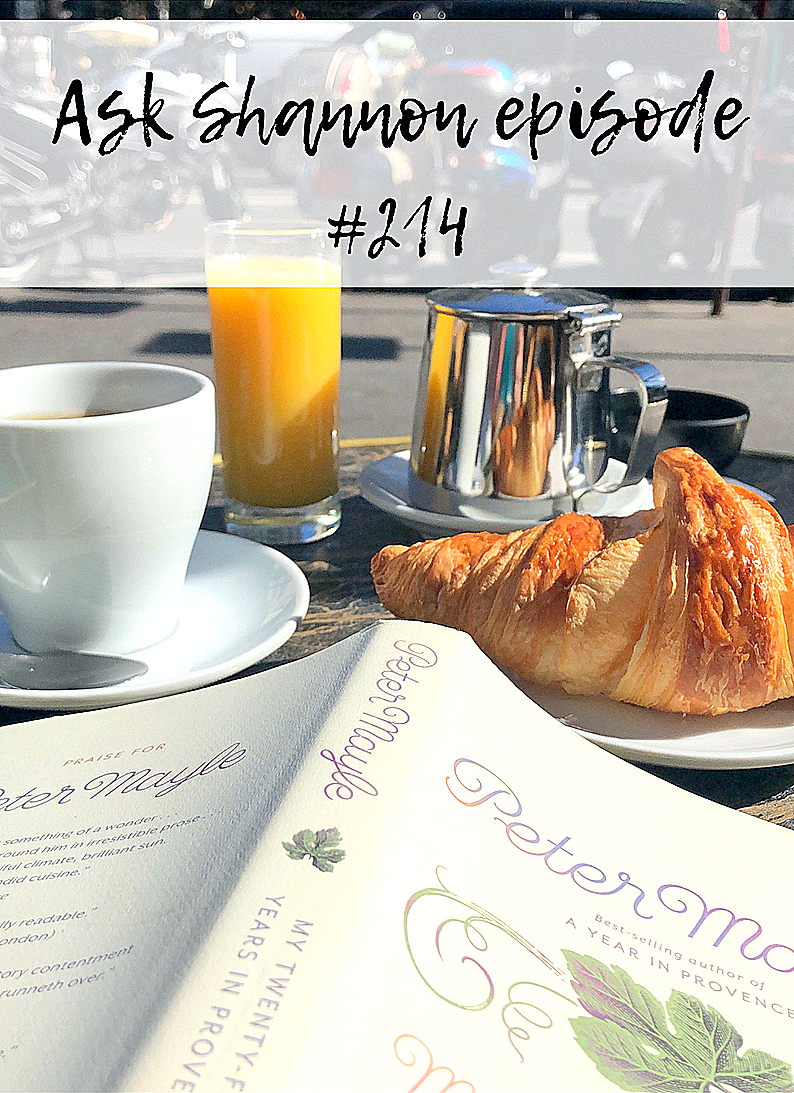 Today's episode is over one hour of Q & As. Questions from TSLL readers and podcast listeners and answers from me, Shannon. :) This annual episode began last year, and was so well received (the most downloaded episode of the year), it has returned. I do hope you enjoy and thank you to every listener who emailed me your questions. Below you will see a list of topics that are discussed and as well as more specific points. And, the final Q & A is a lengthy excerpt from TSLL's new book, so have a listen if you've already ordered your signed copy or would like to. Be sure to tune in to the episode as I go in-depth on each topic. The links included in today's show notes are recommended to further what is discussed during the episode. I do hope you enjoy the episode, and if you'd like to listen to last year's inaugural episode, have a look/listen here (#161). I also did a mini Ask Shannon episode in January 2018(#191) in which traveling to Paris was one of the topics (what to pack), favorite totes and much more. Health & Beauty: Today's episode is over one hour of Q & As. Questions from TSLL readers and podcast listeners and answers from me, Shannon. :) This annual episode began last year, and was so well received (the most downloaded episode of the year), it has returned. I do hope you enjoy and thank you to every listener who emailed me your questions. Below you will see a list of topics that are discussed and as well as more specific points. And, the final Q & A is a lengthy excerpt from TSLL's new book, so have a listen if you've already ordered your signed copy or would like to. Be sure to tune in to the episode as I go in-depth on each topic. The links included in today's show notes are recommended to further what is discussed during the episode. I do hope you enjoy the episode, and if you'd like to listen to last year's inaugural episode, have a look/listen here (#161). I also did a mini Ask Shannon episode in January 2018(#191) in which traveling to Paris was one of the topics (what to pack), favorite totes and much more. Health & Beauty:
Petit Plaisir:~The New Paris podcast with Lindsey Tramuta (Lost in Cheeseland blog) ~inspired by her latest book The New Paris (2017) ~SPONSORS of Today’s Episode:

|
Mon, 18 June 2018
 ~The Simple Sophisticate, episode #213 ~Subscribe to The Simple Sophisticate: iTunes | Stitcher | iHeartRadio | YouTube | Spotify
"Alone, we can plumb local markets and examine their wares closely. We can breathe in and relish the flavors in a sauce, or the coolness of a pitcher of cream. We don't necessarily take time to do these things in the presence of company, particularly during lively conversation. A solo meal is an opportunity to go slow; to savor."—Stephanie Rosenbloom, Alone TimeDiscovering an enticing book and being delighting with the contents even more than expected, wanting the pages, vivid images and revelations to continue beyond the last chapter. Experiencing a day long anticipated that unfolds seamlessly, exceeding expectation. Sitting down for a meal bursting with precisely paired flavors which make it all but impossible not to solely absorb and beg your memory to remember each moment of the experience. Savoring, as Stephanie Rosenbloom shares in her new book about solo traveling, has been long recognized by social scientists to be one of a number of ways to enhance our levels of happiness. And psychologist Sonja Lyubomirsky shares the benefits of becoming skilled in savoring, "People who become skilled at 'capturing the joy of the present moment', are also 'less likely to experience depression, stress, guilt and shame." Okay, the skill of savoring, count me in! Now let's talk about how exactly to invite more opportunities to savor into our everyday lives. 1.Become acutely aware of all of the goodness in each momentCiting Fred B. Bryant's book Savoring: A New Model of Positive Experience, we must come to be able to recognize when we are experiencing an positive moment. And in the moment "aim for the most joy to be found". That is the definition of savoring. 2. Utilize all of your sensesRosenbloom cites Julia Child enjoying her first meal in France at La Couronne in Rouen and Poilâne founder's granddaughter as precise examples of becoming aware of what each sense is experiencing. From what something not only looks like, but smells, feels, sounds and tastes like. 3. Take your timeWhen we rush, we miss out. We miss the butterfly dancing around our nose, the passersby's exquisite sartorial taste displayed in the most subtle, but creative manner, and the scent of the boulangerie's freshly made bread in the morning as we walk to work. Savoring requires of us to slow down, to reduce the amount of "to-do"s and prioritize what we truly need as well as want to do. When we edit well, we live well as it permits us time to be fully present. And when we are full present, we are able to pause, observe the detail in the pastry we are looking forward to enjoying, but appreciating the artistry and attention to detail that was spent. 4. Give your full attentionCase in point, in order to savor, we must be in the moment, we must not be distracted. Not only must we not be distracted by our phones, but our minds and the ideas and thoughts that swirl about. Of course, we should use our minds and when we get lost in our minds, we can discover the most creative ideas we never thought would be possible, but when we are experiencing a positive moment, choose to set the thoughts aside and soak up all that the current experience is offering you. 5. Let go of habits that don't enhance opportunities for savoringIn some instances, adhering to habits can be a truly beneficial concept to welcome into your life, but it is imperative to examine closely the habits you follow. Rosenbloom suggests letting go of "multi-tasking, worrying, latching on to what's wrong or negative, and ruminating about the past or future." 6. Focus on what you want and you'll find it more oftenIn order to find something to savor, we must look for it, desire it, imagine it, come to understand it. And if we are thinking about positive outcomes and experiences, we are more likely to come across them in the present moment. 7. Limit how often you let your mind wanderAccording to a study conducted by Matthew A. Killingsworth, A Robert Wood Johnson Foundation Health and Society scholar, and Harvard psychologist Daniel T. Gilbert, "one of the strongest predictors of happiness is whether or not your attention is focused where you are in the present . . . people are substantially less happy when their minds are wandering than when they're not." 8. Appreciate every moment as finiteWhen we recognize that any moment is precisely that - a moment - the skill of "temporal awareness" Rosenbloom states heightens our ability to savor and thus our enjoyment of said moment. For example, today we have three more days of spring. Why not do something in the next three days that you will not be able to do when summer arrives? Drink up this activity, relish it, get lost in it, so that when summer arrives you can know you drank up all that spring offered and are ready to be fully present in the new season. 9. Plan ahead to appreciate the event even moreStudies have also revealed that planning well ahead of any trip or event heightens the appreciation when it arrives as well as our happiness leading up to it in anticipation. The recognition of the work and effort paid to make the plans and either bring people together or attain a particular experience. So upon being in the moment (the trip or the event), we are more readily prepared to be present and savor the experience. While Rosenbloom's book is focused on travel, and specifically solo travel, when we welcome the skill of savoring into our everyday lives, we begin to enhance the quality, reduce the need to cling and trust that we will be able to find something to savor each day - some may be grander than others, but each offers a gift to experience happiness. Ultimately, when we acquire the skill of savoring, we are creating a memory in our minds, a file of sorts of our experiences from each day, trip or event, so that when we want to get lost in our past in a positive way, we can recall the beauty that we had experienced, and thus be encouraged about how amazing our life has been and will continue to be. And so last Friday on the concluding day of school and the commencement of summer holiday, I put into practice the skill of savoring. The boys and I went to a local bakery, found a cozy seat and table outside, ordered tea and pastry, and just took in the beautiful weather, the temporal company and a very good book. It was something I knew I wouldn't experiencing for another 12 months and I did my best to soak it up in its entirety.
~SIMILAR POSTS FROM THE ARCHIVES YOU MIGHT ENJOY:
~9 Reasons to Savor Begin in the "Choosing Seat": The Gift of Being Single in Your 30s, 40s, 50s and Beyond, episode #199 ~Why Not . . . Savor the Reasons for the Season? ~Learn How to Truly Savor Everyday Moments & Watch It Elevate Your Life, episode #163
Petit Plaisir
|
Mon, 4 June 2018
~The Simple Sophisticate, episode #211~Subscribe to The Simple Sophisticate: iTunes | Stitcher | iHeartRadio | YouTube | Spotify In America we have the story that ... your sex drive evaporates. ... Nobody wants to sleep with you, but you don't want to sleep with them either. ... And it turns out that that is really much more of a cultural story than a biological story, and ... people's behavior responds to this cultural story. ... In France there's a slightly different narrative. ... Women in their 50s and 60s in France are much more sexually active than women in America are. So I don't think you can ... snap your fingers and switch cultural narratives. But just knowing that it's not biologically inevitable I think gives you some power over it." —Pamela Druckerman, author of the new book There Are No Grown-Ups: A Midlife Coming-of-Age Story (read the entire NPR interview here) Over the past four or five years I have taken notice of how women step into each year of their life after forty. Whether women who are in my inner circle or women in the media spotlight, I listen to how they speak about their physical capabilities, their physical beauty, their curiosities, their chapters in life, the roles and careers they wish to stay or become a part of. As someone who is 39 and has truly let my age just be a number, not centering my identity around my age as it is one detail I cannot control (sometimes I forget my age, does that happen to anyone else?), I am intrigued in the shift in what is expected of women by women - and thus society - as they age through the decades. Because our message to each other has power, and that message in large part tells the world what will be accepted or ignored. As someone bringing up the tail-end of Generation X and partially straddling into the Millennial Generation, I certainly have seen a shift in the knowledge and thus attention to good health when it comes to fitness and well-being as opposed to my grandmother's generation. A tremendous shift in society in the late 20th century brought to our attention what our bodies and minds are truly capable of so long as we care for them well. I think of Ruth Bader Ginsburg and her whip-smart, savvy prowess on the Highest Court in the country at the age of 85. I think of Dame Helen Mirren who at the age of 72 continues to playfully immerse herself in her acting career and her life as she explores the world. I think of 52-year old Oscar winning actress Viola Davis and her determination and talent on the big screen and small screen, as well as her physical good health and Sandra Bullock as well as Cate Blanchett and Michelle Obama and Diane Keaton and and and and . . . the list goes on. Each one of these women marries knowledge with curiosity and applies it to their mental as well as physical health. Physical maladies can certainly befall us due to genetics, but there is far more health obstacles that are avoidable so long as we provide ourselves with the information and live in such a way to be preventative. Two situations happened over the past couple of years that found me responding in frustration internally, but saying nothing in the moment. The first was a situation with my own mother and my young pre-teen niece in which my mother said something about what was physically inevitable when you hit "her age". In actuality, what she shared was false, and I later did say something in private to my mom as I am someone who has heard such "untruths" from older women when I was young. I know now that what they shared was their ignorance regarding how the body grows and ages, but I didn't want my niece to have to navigate toward to the truth when the knowledge was readily available. The second situation is an ongoing one as I have a dear friend who refuses to say her age or acknowledge her birthday as her husband told me she is "sensitive about her age". While I respected this wish, I also want her to know how much I want to celebrate her because I think she is absolutely amazing, talented and uber intelligent. The truth is if we as women will let go of identifying ourselves with our age, then half of the world will stop seeing us through the narrow lens of assumption regarding what "should be" happening at a particular point. We all know that with different people, different things happen at different periods of our lives. Case in point, actress Rachel Weisz is pregnant at 48, yet press in the U.K. is fearful it may be nearly too late for Meghan Markle to conceive. Are you kidding me? What we consume or accept as a culture can either limit us or liberate us. What we allow to be accepted because we do not contradict it when we know it is utterly false will continue to be perpetuated. We can either speak up or act in such a way that demonstrates the falsehoods are indeed false. Each of us will choose what is most comfortable for us - speaking or acting, but I implore you to not shrink to fit inside the limiting box that society would have women at any age stay within. Part of the difficulty with staying relevant, man or woman, is staying apprised of the dynamic world we live in. With each year we are layering more information on top of what we already know and in so doing we become acutely aware of how much we still have to learn. It can become overwhelming. It happened this year as a teacher who began teaching at 22 and knew how to relate culturally with the students - the music, the films, the colloquialisms, each far simpler to grasp and understand because I was partially still in their bubble - that I acknowledged and took note that I could be considered two generations removed from my students. While I still understood some of the references made by students, there were cultural allusions that no more my students grasped (the 80s hit sitcom Cheers, for example). While some cult classics are returning and being devoured by teenagers thanks to Netflix and YouTube - FRIENDS, The Joy of Painting with Bob Ross on PBS, etc. - but after listening to different podcasts my students will bring my attention to or music my students will mention in class, I am reminded that we all live and will always live in a dynamic world. And the key is to understand how to remain involved, knowledgable and curious instead of quailing, shrinking or removing ourselves due to fear or confusion or exhaustion.How to remain a part of the ever-changing world:1. Build a social network of all agesOne of the benefits of teaching is that there is youth everywhere each and every year. While yes, it's kind of like Groundhog's Day (the film), the benefits far outweigh the negatives as I am reminded that learning is always available if we choose to seize the knowledge and therefore change is perpetually constant. Progress is always possible and staying the same is never a good idea if we wish to reach our full potential. And so why not build friendships, acquaintances, mentor or mentee relationships with individuals of all ages? When we do and do so with an open mind, our perspective is broaden, our understanding deepens and we come to appreciate where we've been, how far we've come or become even more excited about where we are heading.2. Refrain from ageist comments (younger or older)The quickest way to shut-down an opportunity to get to know someone is to make assumptions about what is expected at a certain age. When we do this, instead of seeing the individual and being patient enough to get to know the individual, we are telling them (consciously or unconsciously), who they truly are and who they are capable of becoming is not all that important to us. As well, when we make ageist comments we perpetuate limitations that we ourselves will eventually be subjected to. In other words, we have the power with the words we do or do not utter to change how society views anyone at any age.3. Master your mind and cultivate a positive mindset“When it comes to staying young, a mind-lift beats a face-lift any day.” ~Marty Buccella Providence, St. Joseph Health shares, "Negativity saps vitality and creates stress, which affects your health and well-being." So literally, by being cynical, negative or close-minded, we are exacerbating the aging process and making ourselves physically older unnecessarily.4. Let go of the word "should"Whether speaking to others and expressing what you think they "should" be doing or the internal dialogue that runs through your head saying you "should" be doing something in your life at any given point, stop. Nobody wants to hear what they should be doing. Instead inspire others to do something with how you live your life or simply let them navigate their way in their own way.5. Seek out diverse experiences that stretch youWhether with the places you travel to, the food you eat, the books you read, the podcasts you listen to or the people you engage with in conversation, let your curiosity be fed. Often the reason individuals regress into what they've known and the "way it has always been" or "when I was younger" constructs and wish to stay there is because they are fearful of the unknown. What they know is comfortable, and we all somewhere along the continuum want comfort. However, too often, when we don't know about a particular culture, a particular way of life that becomes more prevalent in society due to news coverage or a change in economic structure, until we explore, prompts people to make limiting assumptions that shrink our world. The world is big, vast, amazing and from my experience here on the blog and in my own travels meeting people from around the world, the majority of us are seeking contentment, love and peace. This may sound over-simplified, but truly, our general goal is the same, it is a matter of having the courage to keep asking questions, keep making ourselves vulnerable and recognize that we do not have all the answers and respecting all people as they too are trying to figure it out.How to enjoy each passing year more than the last:1. Learn something new regularly“For the unlearned, old age is winter; for the learned, it is the season of the harvest.” ~Hasidic saying I have seen the deterioration of one's mind in late age when a particular octogenarian who prided himself on having only read one book in his life gradually sees the quality of his life diminish. Knowledge is power in not only understanding how to live, but in keeping ourselves vibrant and able to engage with the world fully. Studies have recently been shared that regular cognitive challenges - problem-solving, learning a new skills, in other words brain exercises - are good for brain health. It is something we keep alive or by not giving it "homework" passively let wither away. Once we have the knowledge and understand how to continue to acquire it as we move through life, then we can apply it and see the benefits of the efforts we've made - thus the harvest. So keep planting seeds and continue to see your harvest become richer and richer with each passing year.2. Choose to understand the worldProviding context as to why events happened, why people made the decisions they made and why people reacted as they did deepens not only our understanding of the world but also how to move and live successfully in it so as to live a life we are proud to share with the world as well as reflect upon. Never settle for one person's version of events, explore, ask questions, pick up a biography of someone else who lived in that time, read a historical account from multiple perspectives and come to understand that the world isn't simple, events aren't a singular cause and effect, but more often a confluence of causes that create the outcome that after some time has passed becomes simplified into a singular soundbite. As well, come to understand the social sciences - psychology and sociology and how people interact with others, how our minds work, how our bodies work regarding hormones, endorphins, adrenaline, etc. Choosing to understand the full human experience paired with the events of the world that led us to where we as a world are today is empowering and can assist us as we figure out how we wish to move forward.3. Contribute to the worldIn another study, it demonstrated that we must live in such a way that goes beyond giving, or "feeling useful"; we must take action so as to do something that leaves the world better than when we found it. Taking action will be different for each of us, but just giving of our time to help the next generation isn't enough (it's a start). Sometimes taking action will not be comfortable for those around us. Sometimes it will not be comfortable to us as we will have to push ourselves to learn something new, shift our views and understanding about something we had become accustomed to but now we realize we were wrong, misled or misinformed. But when we find a purpose that fuels us, that we truly have a passion for, we will find the fuel to push forward. And in pushing forward, the example we share with the world will potentially alter how society comes to understand what is possible at any given age. 4. Let go of negative stereotypes and stop perpetuating them regardless of your age“Age is no barrier. It’s a limitation you put on your mind.” ~Jackie Joyner-Kersee A study conducted at Yale revealed that "older adults who held more positive age stereotypes lived 7.5 years longer than their peers who held negative age-related stereotypes". Not only should we shift away from negative age stereotypes we should stop burdening others with these beliefs as well. Whether it is our observation and commentary about strangers on the street, in the store or mere acquaintances, refrain from defaulting to ageist remarks (about those older or younger than you). When we assume, we limit what we are willing to explore as we get to know people, and I am confident none of us would want to be limited.5. Revel in each year“The trouble is, when a number—your age—becomes your identity, you’ve given away your power to choose your future.” ~Richard J. Leider Right now I am soaking up all that the remainder of my third decade on this glorious planet will share with me. As well, I am excited to enter into my fourth. When we choose to be present in our lives, we create memories that will always be with us. No we cannot go back and relive them literally, but we can in our memories and that is a gift we can take with us for any age we reach down the road. Each year has the opportunity to be your singular definition of what it is to be [pick a number]. And it is important to remember that that is your definition and yours alone. To place it on someone else and expect them to live the same as you is to limit what they may be curious about. On the flip side, embrace what you are curious about each year. Embrace what the universe has given to you in this particular year and drink it up like it was water in the desert. When you revel, you enliven your being and you share with the world your exuberance. That is how we shift age stereotypes.6. Take the riskMaybe you've had a dream in your mind for years, but you have never known anyone who took such a risk. At least not anyone in what you perceive to be your "situation". Let go of needed a model to follow. Let go of thinking the dream shall remain a dream and instead take the risk. Do the necessary homework and then give yourself permission to get so absolutely excited about living the life you have dreamed about. Yes, you can live that life. And that will enliven you like you never could have imagined. From time to time I will catch myself pushing back against progress when it finds me quite comfortable with where I am in my life (a state that is not always easy to attain for any one of us as we strive toward goals), and then I poke myself. It is at that moment that I remind myself that progress is good as it demonstrates to all of us that we are alive, the world is alive and has the capability of improving. Even when we think we are comfortable (as I have felt in those moments), we often are limiting what we understand to be possible in the quality of our lives. Often I do think part of the push back to progress is exhaustion (which is why it is imperative to get a regular night's sleep - I kid only slightly). Perhaps not physical, but emotional exhaustion as we have seen and experienced and worked for so much and we don't know if we have the energy to continue to strive, shift and improve like we have in the past. But that is when we need to seek out others who see the world and all of its potential as we do, and then we can find the energy we think has been lost. Thus another reason to build a social network of all ages. The world is greater with more diverse voices, lives and experiences. And with each year of our lives we deepen what we bring to the world so long as we continue to truly live each year we are given. ~SIMILAR POSTS FROM THE ARCHIVES YOU MIGHT ENJOY:~Learn How to Truly Savor Everyday Moments & Watch It Elevate Your Life, episode #163 ~26 Ways to Create the Life You Want ~Why Not . . . Extinguish Self-Doubt? Petit Plaisir:~fresh seasonal fruit, in my case most recently - Oregon strawberriesRecipes to try:
~SPONSORS of Today’s Episode:
 Images: TSLL's Instagram Download the Episode
|
Mon, 7 May 2018
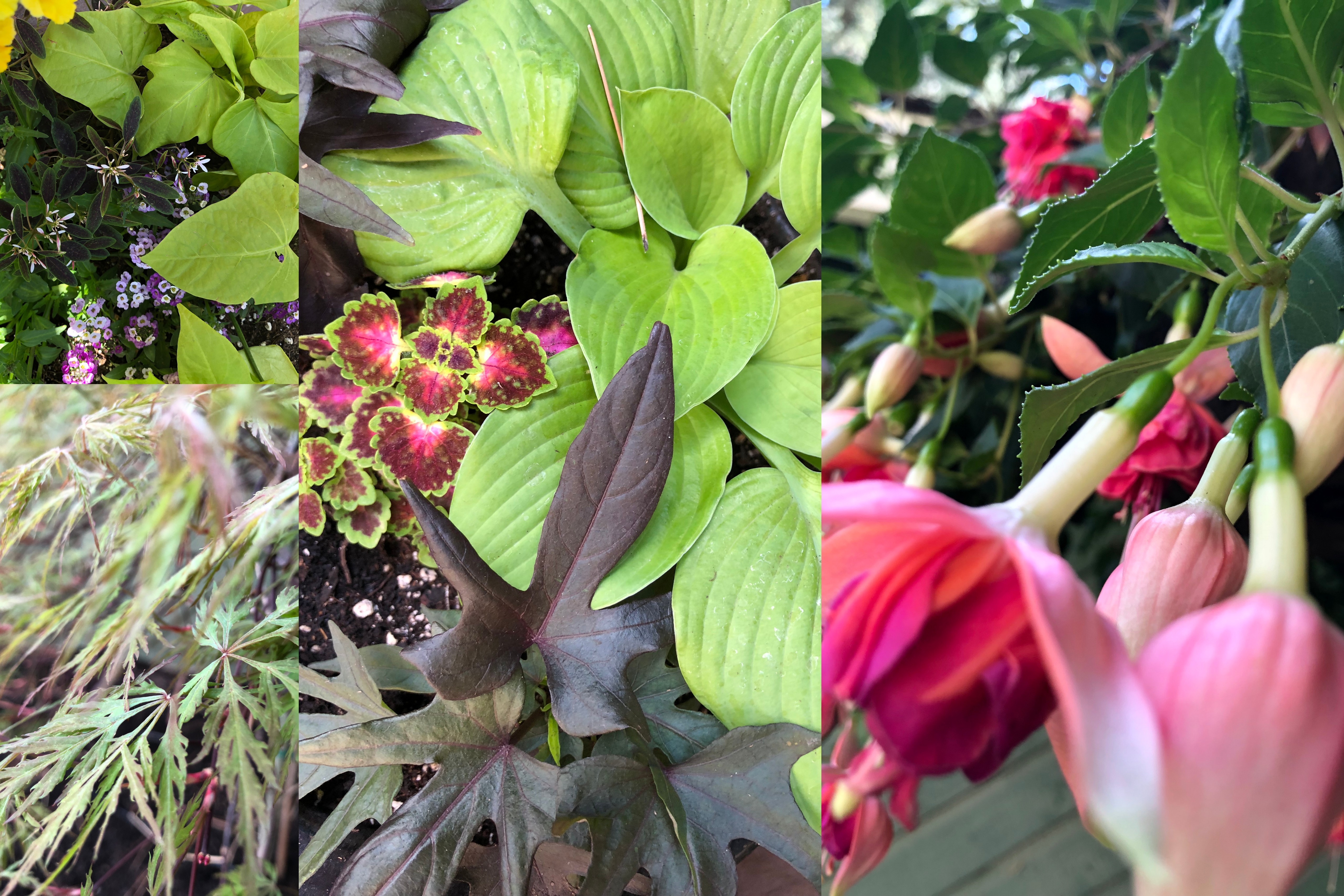
"If you have a garden and a library, you have everything you need." — Marcus Tullius CiceroClaude Monet's gardens at Giverny, Butchart Gardens near Victoria, Canada, or the grounds of Versailles in France. Each and many more outdoor masterpieces which utilize the gifts of Mother Nature to enchant visitors are as glorious as they are intimidating to those of us who are curious to welcome similar beauty onto our own properties and sanctuaries. Having grown up with a mother who has a sincere love for gardening and whose canvas is more than a few acres, I watched as she painstakingly watered by hand all of her flower beds, raised garden boxes for years until automatic sprinklers were put in. During the winter months she still goes through the garden catalogs and plants seeds far in advance of the spring season, nursing them in her sunroom and then in her green house before planting them in their final destination in the yard or garden. Needless to say, the effort master gardeners put into their plants, flowers and landscapes can easily be a full-time job. And while many of us may want and appreciate the gifts that spending time around such natural beauty brings into our lives, we may not all either have the space, property or ability due to renting or the time or devoted passion. I find myself a little in both camps for my reasons for not having a bountiful garden and yard. While in my previous home, of which I owned, I invested much money installing automatic sprinklers, planting new trees, installing a cedar fence, along with the seasonal attention that is required, part of me is quite relieved to not have to rake 40 bags of leaves each year or worry about investing in a landscape architect to mold my yard into an oasis because I am currently renting and do not know the cottage I call home at the moment. However, on the flipside, I derive great pleasure from being outdoors, enjoying the vegetables, herbs and somtimes fruit from my garden as well as arriving home to a bevy of daffodils in the spring, lavender in the summer and lush hostas tucked into the shade in my flower beds surrounding my front porch. Mother Nature is an elixir, a form of comfort and a destination to unwind, relax and appreciate the natural beauty that can surround us should we choose to welcome it into our lives. So today I wanted to share with you how you too can welcome the gifts of a yard and garden into your life without being someone who has the Master Gardener credientials or even wants them. Rather by adopting a few or all of these ideas shared below, you can cultivate the simple, yet powerful gifts a thoughtful approach to tending to your garden and yard can bring. 1. Keep it simpleAs with other areas of our lives, keeping what is necessary and valued and letting go of what is not enables simplicity to be the guiding principle. Even if we are in awe of our neighbor's yard, our space, time and budget may be different. Taking an approach to welcoming more color and fresh plants as well as a gardening space must work for you. So take a look at what your space and time allow (each spring I know I will be planting five pots, looking for one hanging basket and planting my garden which is 4 feet by 8 feet), and enjoy the process of enriching what you have and celebrating, not comparing what you have createed with others. 2. Find your Hardiness ZoneDepending upon where you live, you will have more success with some plants than others. For example, as IG followers know, I am a fan of hydrangeas, but I have never had luck growing them in either of the locations I have attempted due to the zone in which I grow them. While yes, there are often hardier variations available, the classic hydrangeas with the huge mopheads are not something at the moment, I have the opportunity to grow. Therefore, I do not invest in them. If you live in the states, check out this website to determine your hardiness zone based on your zip code, if you live in the United Kingdom, check out this website, and if you live in Canada, check out this website. For all other countries, simply type in "hardiness zone and your country" and you should be able to find a similar website. 3. Shop smart (when and what)Now that you know what types of plants to buy (good news, often the local nurseries will primarily stock what does grow well in your area), keep in mind that shopping early in the nursey season will ensure you have the best selection. As I shared a few weeks ago when my favorite local nursey opened its doors for the first time of the season, I made sure my list of annual plants was ready based on what I needed, and stopped by within the first 48 hours. Now, keep in mind, shopping early is key for those particular items you are going to want that often sell out quickly and are not restocked. For example, Creeping Jenny plants (see here) tend to be hard to find later in the spring as they are quite popular pot drapers. And flowering bulbs such as dahlias, cannas and lilies can be planted in spring as well. But other plants or bulbs will not become available until, for example, late summer and fall such as daffodils as you plant the bulb in the fall so that they will flower in early spring. ~Check out the Ultimate Flower Calendar here for which flowers to shop for and when to plant. 4. Grow an herb gardenNo matter how big or small or even whether you have outdoor space or not, you can always have an herb garden, and I highly recommend that you do. Especially if you are someone who enjoys cooking, you will be saving yourself a decent chunk of change by having, for example, a basil plant (and paying $3-5) than paying $4-5 at the grocery store each time you want fresh basil leaves. In 2013 I wrote a detailed post on how to create your own mini garden, and part of the mini garden details having an herb garden, as well as the herbs to include. If you do plant an herb garden outside, some of your herbs will not need to be replanted each year. Sage, rosemary, flat leaf parsley and even oregano have demonstrated in my own garden to be quite hardy. 5. How to pot a pot: Basics that WorkThere are three components to shopping for the plants to put in your outdoor pots. Whether they will be in the sunshine or in the shade (hanging baskets can follow this prescription as well - although I often buy a basket full of one plant to simplify), include these three components (just three different types of plants - you can buy multiples if your pot is large enough) thriller (for height), filler and spiller Successfully Grow Plants in Containers. Paul Allen Smith is my garden guru and his terminology of what to put in the pots is easy to rememember. Read his detailed post about how to . For example, in my front porch which is in shade for most of the day my basic formula is a hosta for the height (thriller), coleus for the filler, and sweet potato vines for the spiller (they are very delicate, so while I bought them in April, I kept them inside until just a few days ago when the last frost was well behind us). When summer and early fall has past, I plant the hosta (which is a perennial plant) in my flower bed to continue to bring more green, lush filler to the front of my house.
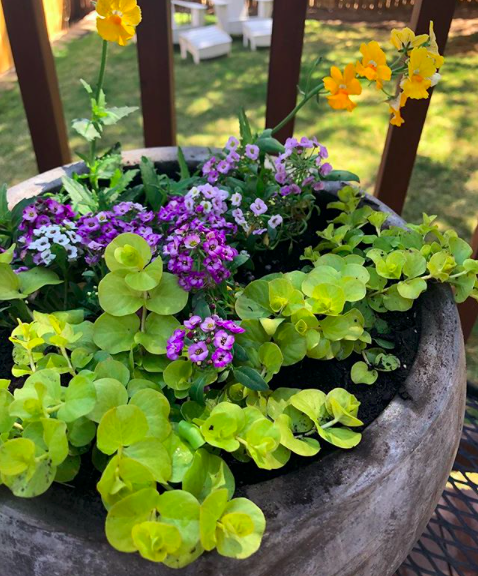 ~This is one of my "sun" pots full of Creeping Jenny in the forefront, the spiller~ 6. Add a few perennials to your yard each yearPerennials can be expensive, but part of the reason their price tag is higher is they last for more than one season. Whether it is a shrub, a hedge, the bulbs for tulips or daffodils, roses, or anything thing you determine would complement your yard and survive in your climate, gradually bring a few more into your yard each year as your budget allows. Take time when making decisions about perennials and watch how the sunlight falls in different areas of your yard to determine exactly what plant or tree would be best. 7. Follow an expert or a few who offers ample inspiration and informationTSLL blog is not a gardening blog as readers know, but I am regularly encouraging time spent with nature as a means for a more content life. If I can do anything to assist you in your journey to welcome more Mother Nature into your home, it is to offer the encouragement to indeed welcome her with open arms. There are many fantastic gardening blogs available to read and follow. Some offer expert advice (as I mentioned Paul Allen Smith above is my trusted go-to), some offer visual inspiration (I love Sharon Santoni's home and yard), and some offer it all along with the ability to purchase the flowers they grow such as Floret's Flowers (her dahlias are her rock-star product, but her daffodils are amazing as well). 8. Water regularlyAs with anything we want to grow, regular watering is a must. Now for those of who travel, this can become difficult as we want to travel during the summer, but we've also invested some money in our plants and we want to return to a home with living, beautiful blooms. Consider carefully placing your pots so that your automated sprinkler will reach them or ask a trusted neighbor to water your pots once or every other day as necessary. 9. Use good soilQuality matters as well when it comes to gardening. This year I purchased a yard of organic soil builder - compost - from our local county recycling business for $15. Now I also had to pay for them to deliver it, but I wanted to give my garden an extra rich, nutritious foundation. You can also buy something similar in bags at your local nursery, but price per pound, this was an amazing deal, and I didn't want to pass it up. "Feeding" your soil and ensuring it is of good quality is the key to building a successful garden. There are other ways you can tend to your soil organically as shared by Better Homes & Gardens - add shredded leaves, animal manures or cover crops. Read more here. 10. Make a plan and map it outWhether it is planning for which plants to put in your pots, how your landscaping will look or the layout in your garden (which vegetables and fruit go where), plan it out first. Better Homes & Gardens offers a Garden Planner which is simple and easy to use, but you can also simply pencil it out on a pad of paper. I find myself over-buying of one plant and not purchasing enough of another, only having to make a second trip (which I don't mind, but it would simplify the process to get what I need in one trip). 11. Visit your local farmers marketWhether you have a garden or not, flowers or not, an outdoor herb garden or not, knowing you can always slip away to your local farmers market to pick up fresh produce, a beautiful seasonal bouquet of flowers for the home and perhaps a potted basil plant for the window sill, is a perfect way to soak in Mother Nature's gifts and welcome them into your home. When we take the time to savor the seasonal bounty having pulled the carrot from the soil, plucked the fresh strawberry from the vine or picked the apples from the tree, we are respecting what Mother Nature has provided and tending to our health and wellbeing along the way.  I hope you have discovered a few tips and ideas for beginning or enhancing your home yard and garden experience. For me, having an outdoor space, no matter how small, has always been soothing and necessary to find the balance of my days. However, initially all of the decisions made available when I stepping into a necessary put me in sensory and selection overload. While I still delight in visiting nurseries, I more clearly trust my decision making and enjoy the experience knowing that when I bring home what I have found, my space will become more welcoming and more of a sanctuary than it already is (all the while saving my budget).
SIMILAR POSTS/EPISODES YOU MIGHT ENJOY: ~Why Not . . . Create a Mini Garden? ~Farmers Markets: How to Make the Most of Your Visit No Matter Where You Live (Bend's Farmers Markets are Shared as well) ~Watch the pilot episode of The Simply Luxurious Kitchen: Seasonal Fare to Elevate the Everyday (season 1 begins on Satuday September 8th) ~ASK SHANNON 2018, Submit your questions now.
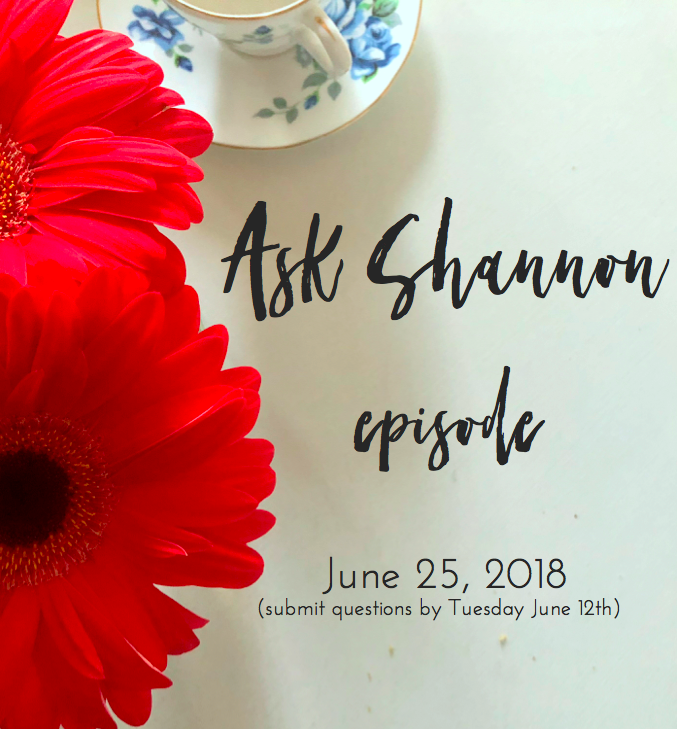
Petit Plaisir:~Ritz and Escoffier: The Hotelier, The Chef and The Rise of the Leisure Class by Luke Barr~other books by Luke Barr - Provence, 1970: M.F.K. Fisher, Julia Child, James Beard and the Reinvention of American Taste 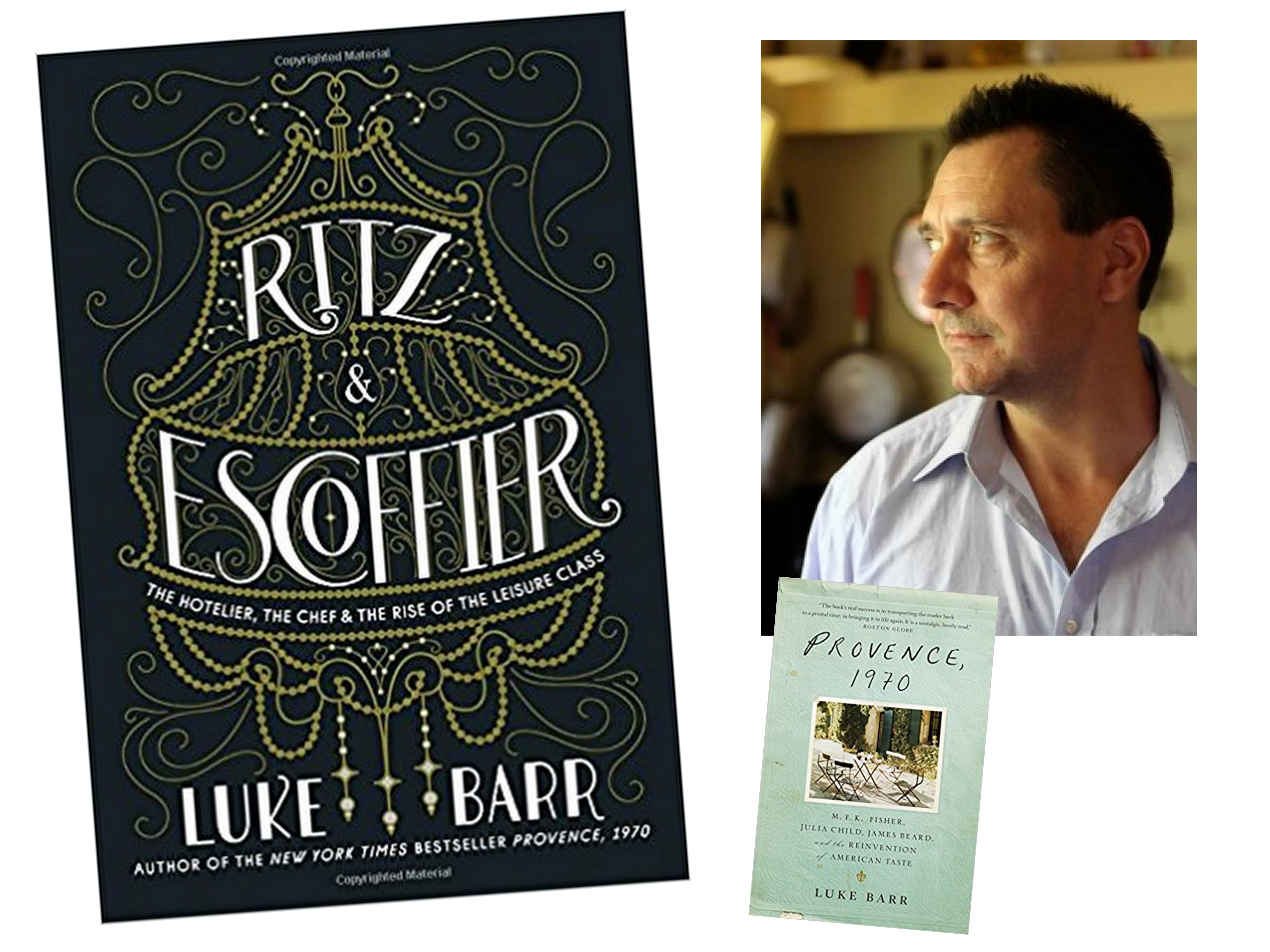 Sponsor of this week’s episode:
Images: (1) from TSLL's home in Bend, Oregon (potted plants, fuchsia, Japanese maple, hostas, coleus and sweet potato vines) (2) pics captured at Bend's first day of the farmers market |
Mon, 30 April 2018
~The Simple Sophisticate, episode #206~Subscribe to The Simple Sophisticate: iTunes | Stitcher | iHeartRadio | YouTube
1. Take a day offWhile this may sound impossible initially, take a moment and consider the quality of the life you are living. The key to living well is to ensure how you are navigating your life is savvy. And if you do not have the energy to do so well, take a day to recharge. Some call such days "wellness days", but no matter what you call it, they are necessary from time to time. Last week, and for the past few weeks, my motor has been geared in high. With unexpected events, finishing up projects and stress levels that didn't have time to descend, I found myself in need of a day to just do nothing. So this past Saturday, that is all I did. Staying at home for me was a necessity that I recognized I needed to fully reboot. 2. Fresh Bouquets that Last for WeeksHaving flowers around my house just make me happy. The house doesn't feel complete without a fresh bouquet of either hydrangeas (yes, they seem to be my year-round flower of choice - #tsllhydrangeas), or any other seasonal bloom I find in the store at a great price. And when they arrive home, I do my best to enable them to last as long as possible. How? Trim stems and add fresh water every 4-7 days. Slice up the stem about 1/4 -1/2 inch to enable the stem to absorb the water. I do my best to buy the most freshly cut flowers, and while sometimes it is hard to tell in the store, look for tighter buds that haven't fully blossomed. Within a day or so, they will be in full bloom and your house will have their full life. 3. Facial masque, put on before stepping into the showerI try to give my skin either a moisturizing masque treatment or a pore-cleansing treatment 1-2 times a week, but my time is limited. The best advice my long-time estetician gave me was the go-ahead to simply apply my masque (after cleansing), then step into the shower and let the steam work its magic. Rinse in the shower (less mess to clean up), and voilà, two for one! 4. Express gratitudeAs a child I had heard the advice that giving and expressing thanks is a powerful ingredient to feeling contentment and finding peace. However, at the time, it didn't compute. Don't get me wrong, I observed this behavior in my parents and those around me, but it wasn't until I was an adult that it truly was understood. When we feel as those much of our lives is out of our control or overwhelming, one of the aspects we do have control over is how we interact with others. When it appears that very little is functioning as it should, or your energy level is depleted, looking around to see what see what we are thankful for and expressing that appreciation not only will paradoxically fuel us with positive energy, but build a stronger, positive bond with those in our lives and community. The purpose is not to gain adulation or something in return, but it is the exchanging of good energy, paying recognition to others and their lives and how they are living and giving of themselves that assuages any negative energy in our lives. The two need not have any connection, but when we focus on the good, we have less time to worry about what we cannot control. 5. Exhaust your physical beingWhile we all know that adhering to a regular routine is important, it is vitally so when we are overwhelmed to do something to get our blood pumping. Even when I do not have time to work out, I remind myself that it is essential for me to feel better at the end of the day, it will help me sleep better and it will be one less thing to stress about that I did not do. Sometimes the workout can come in a different form such as working in the garden to set up for the spring season or making love with your partner. Whatever exhaustion you prefer, make it a priority. Part of the reason working out is effective when our lives seem overwhelmed is that our minds are forced to be in the present moment. We have to focus if it is an intense strength training session to keep our form correct, or hold Warrior Poise #3 in yoga and not fall on our nose. When we turn our minds off for even 30 minutes, we encourage our bodies to destress. 6. Read a book without a plot or how-tosI recognized recently that if I am having an particularly stressful week, the last thing I want to do is get absorbed by more drama in the plot of a novel, or feel I need to add one more "to-do" to my self-improvement list by reading a non-fiction self-help book. What I have found to be some of the best reading for such weeks are books about food or travel. An escape into a pleasure that is blissful, relaxing for the mind and an opportunity to unwind. I highly recommend Nigel Slater's Kitchen Diaries (a diary of his meals through the season) or any of his books/cookbooks. 7. Take a detoxifying bathSimply add two cups of Epsom salt and let the day wash away. Epsom salt offers sulfate and magnesium, both of which can be absorbed through the skin and magnesium is what stress reduces from our body, so we do need to replenish. As well, epsom salt easing muscle soreness, softens skin and the sulfate helps to flush toxins from our bodies. When I began my strength training program with my trainer, my body had intense muscle soreness, and I was immediately advised to take a bath with epsom salts. Needless to say, sometimes the relief we need can be simple and pleasurable. (Read more about epsom salt here from mindbodygreen.) 8. Reduce unnecessary time using technologyI am just as guilty as the next person for looking at my screen (phone or computer) when it isn't necessary and is simply out of habit. However, it was clear to me that constantly having my eyes on a screen was something that was not helping my stress levels. Put down the phone, plug it in to be charged and walk away. Once we find a spot in our day when we have completed the necessary tasks, and we do not need to be available for a text or phone call, put it in another room. Having it close by increases the likelihood that we will check it, just to see. 9. Talk to someone who is trusted and calmWhen we talk to someone who knows us, understands our life, but at the same time can recognize when we need to breathe, reboot and not be so hard on ourselves, we are reminded why we need to connect with others. However, we also come to see the power in the types of people who are in our lives. It is during these stressful moments in our lives that we can be thankful we have built and nurtured such loving, supportive relationships because sometimes we cannot give ourselves the advice we know we need. 10. Turn on a relaxing playlist and turn off the newsYesterday I shared an Everyday Jazz playlist which is often my music of choice when I want to take a deep breath and unwind. Whether at school, home or traveling, jazz, as well as classical is the remedy to lower my stress-levels and just get me tapping my toe, swaying my head or slowing letting go of anything that came before. While staying abreast of the news is important (we talked about how to find the right balance in this episode/post), too much can be detrimental. Finding an alternative that offers the comfort and pleasure that you are looking for is a simple click of a button away. 11. Sip some teaThe type of tea you choose will be up to you, but for me, since I have a high tolerance for caffeine, I always go to my black teas. The something hot, something delicious and something to sip slowly, slows me down and calms me down as well. Read this post from the archives regarding the many benefits of tea, as well as see my list of favorite teas. ~Why Not . . . Automate It? 12 Ways to Improve the Everyday ~How to Ensure a Bountiful Harvest (in life), episode #177 ~Sign up for TSLL's Weekly Newsletter or the Book Release News Updates newsletter here Petit Plaisir:Ines de la Fressange's new style guide - The Parisian Field Guide to Men's Style, released May 15th SPONSOR OF TODAY'S EPISODE: |
Mon, 23 April 2018
 ~The Simple Sophisticate, episode #205~Subscribe to The Simple Sophisticate: iTunes | Stitcher | iHeartRadio | YouTube
"Today's accomplishments were yesterday's impossibilities." —Robert H. SchullerI was recently watching a documentary on Julia Child, and prior to meeting Paul, falling in love with French food and becoming the revolutionary figure she became in the food industry, there was a point in her life where she felt "ordinary", and not as special as she had assumed. It was shortly after the death of her mother to whom she was quite close and also during a time when a man she had been deeply interested in, married someone else. She returned to her parent's California home despondent and not sure of which way to go or with a clue of what to do with her life. Then World War II occurred and she chose to take part in any way she could. The rest is history in many ways, but this lull in her life provided a time of uncertainty about the future and a recognition that what lay ahead for her wasn't something she could predict or foresee. If you are someone who listens to their life, but also does all that you can to plan and put the odds in your favor, you, like me, have no doubt realized that there are still moments, some short in duration and some quite long, that seemingly give no clue how our lives will unfold. Such times are excruciatingly uncomfortable. Excruciating because we do not know if what we are doing is a lost investment or a wise investment. In such moments we begin to question whether we should have perhaps just "played it safe", not stretched so far, dreamed so vastly and swam so far from the shore. While I cannot sit here and write to each reader and confirm without a doubt that all of your dreams will come true, I can confirm that I am on such a ride right now and have been my entire life in many ways. But I have arrived on the other side of many of my worries in the past to see a beautiful reality that at some point along the way only seemed a dream, and in many cases, an impossible dream. Today I'd like to share with you eight things to either do or ways to shift your mind that will help you travel through these inevitable times that we will be introduced to along our journey should we be strong enough to walk away from the "safe" route. I put it in parenthesis because nothing is assured or 100% safe. In fact, when it comes to our mind, I have come to realize that we often have fear that our dreams won't manifest because we want them so badly. If we didn't, we wouldn't give them a second thought. In this instance, we are creating a sense of anxiety that we can actually let go of which leads me to my first point. 1.Make a plan and keep striving forwardIt's one thing to be worried your plan won't materialize if you haven't done the work. It is an entirely different scenario when you have done the work. Now this is not to say that there is a cookie-cutter approach and then voila! what you want will appear. But the key is to do what you can, keep steadily moving forward, each day, little by little tending to the necessary business and tasks and let go of the "when". 2. Seek meaningIn Andrew Soloman's TedTalk regarding one's identity, he shares, "Forge meaning, build identity. Forge meaning, build identity. And then invite the world to share your joy." Another key to the success we seek, the goals we wish to attain is to strive toward something that is meaningful to you. Make sure you are seeking something that is of great value to you. If a particular political issue draws your ire as to how it is being handled, step forward in a manner you are comfortable with and work for the change you seek. As you begin to do so, you will be able to step into areas that you never thought you'd be comfortable going, but it will be your passion for the cause, if it is sincere, that will armor you from the most common doubts. Whatever you are working towards, so long as there is deeper purpose that is fundamental to how you live life or wish to live it, you will have infinite fuel to carry you along the journey. 3. Find the answers to the unknown questionsWhile we may not be able to find all of the answers we seek, the primary reason we are fearful is because of the ambiguity. When we know, we can relax. And based on my mistake of not fully understanding the benefits of taking my business to the next level (LLC or an S-corp), I wasted years and much money because I didn't ask the questions from people who know the answers. When I finally did ask the questions from my now business lawyer, I could have kicked myself. My fears were assuaged because I had the answers, and the answers gave me back the power to make better decisions to determine my financial and personal future. 4. Reflect on your pastAs I look back over my past and consider the other uncertain times and what eventually unfolded, I am reminded that so many unknowns that I could not have predicted eventually revealed themselves. So long as I refused to stop striving forward, opportunities presented themselves. The key is to keep striving forward, putting forth your best and most sincere effort, being present and being excited about what you will find. Use your past as a confidence boost and apply the lessons you learned along the way. 5. Leave the familiar pathEven if the crowd or others in your field have been successful doing something a particular way, it doesn't mean you have to travel in kind if that doesn't work or sit well or feel authentic to you. While it is always a good idea to look around to see what inspiration others can spark in you, as Oprah teaches, stay in your lane. Do it your way, do it well. I like to think of it as taking the time to learn the rules, but then breaking them as necessary as you move forward along your own journey. 6. A quick list to remember
7. Become more comfortable with a little messinessIf every day each wheel of your machine called life was working smoothly, every email was answered in fewer than 24 hours, the house was always spick and span clean, every bill was paid in advance without a tinge of worry, and debts were paid in full each month even while we were investing, I would be dancing with glee the rest of my life. Some readers may be saying, but that is possible. Having seen what was going on in my life when such a vision was a reality, I can say only from my experience that I saw it as an opportunity to grow, to stretch, to see what else I was capable of, and so I took risks. I invested in my dreams. Now, as I advance in life, I do hope to become more settled, but the reason I kept stretching was because I knew there was more I wanted to experience, more ways in which I wanted to grow and more I wanted to explore. Because of these pulls and interests, I needed to take risks. And when that decision was made or being considered, my mind and my office (and inbox) were sometimes a mess. Not a mess to clean up, but a mess to work through, a mess that needed to materialize in order to strive toward a dream that I could not have made sense of at the time. But with time, each of us can see the beauty of what the mess can give us. We just have to stop thinking everything must be perfect all of the time. We need to allow our lives to be messy temporarily, sort through it, toss and keep what we should and then see the beauty that we were meant to find. 8. Become more comfortable with not knowingJulie Benezet, who in 1999 was working as a director of global real estate for an online company called Amazon as they sought advice on how to best survive and grow their business, in her book The Journey of Not Knowing shares, "I noticed that when people take chances, they get farther ahead. Too often what happens is people go a more conservative route, because they don't want to deal with the uncomfortable feeling of trying something new when you don't know how it's going to turn out." The key to being willing to take these risks without knowing how they will work out is to become more comfortable with being uncomfortable. In this article she shares four approaches to further yourself in business when it comes to risk taking, and while you don't want to jump head-first without doing your homework, it is important to know that when you have already done the necessary work, you will still feel a bit of fear. Recognize this truth, become more comfortable with this truth, and it will set you free to soar. Whether it is the economy that we wish we could predict, the future of the government we live under, or whether or not our boss will say yes, or the weather will cooperate, the unknown is actually a norm in our lives. What lens we see this unknown through will determine how we navigate through the ambiguity, that while temporary, is inevitable. So take a deep breath, get out of your own way, follow the above eight ideas and enjoy the unique journey you are on.
~SIMILAR POSTS FROM THE ARCHIVES YOU MIGHT ENJOY: ~10 Things People Who Have Found Contentment Understand About Uncertainty, episode #100 ~13 Life Truths to Remember About Making Progress ~7 More Signs You Are Moving in the Right Direction ~Ask Shannon Episode is coming soon!
~Subscribe to TSLL's Weekly Newsletter, learn more here.
Petit Plaisir~Independent Bookstore Day, the last Saturday in April (April 28, 2018)~Visit an Independent Bookstore in your community or wherever you find yourself traveling. “Consumers control the marketplace by deciding where to spend their money. If what a bookstore offers matters to you, then shop at a bookstore. If you feel that the experience of reading a book is valuable, then read the book. This is how we change the world: we grab hold of it. We change ourselves.” ― Ann Patchett, bestselling author and co-owner of Parnassus Books
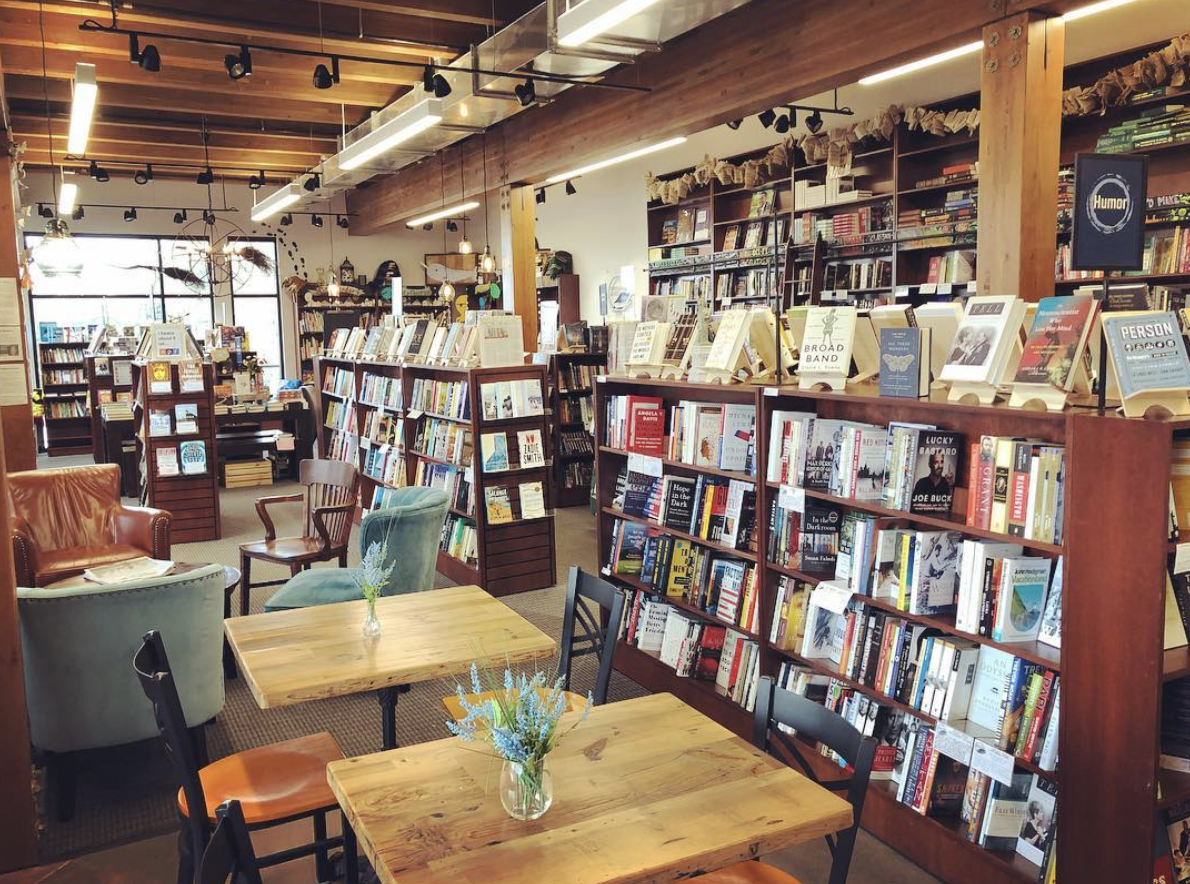 ~Roundabout Books, Bend, Oregon~ |
The Simple Sophisticate - Intelligent Living Paired with Signature Style (lifestyle)

Categories
lifestylemoney
fashion
general
food
relationships
beauty
holidays
style
decor
etiquette
technology
dating
clothing
news
happiness
health
finances
self-help
feminism
french living
communication
inspiration
self-improvement
cooking
French-inspired
podcast
travel
entertaining
Archives
AprilMarch
February
January
December
November
October
September
August
July
June
May
April
March
February
January
December
November
October
September
August
July
June
May
April
March
February
January
December
November
October
September
August
June
May
April
March
February
January
December
November
October
September
August
July
June
May
April
March
February
January
December
November
October
September
August
July
June
May
March
February
January
December
November
October
September
August
July
June
May
April
March
February
January
December
November
October
September
August
July
June
May
April
March
February
January
December
November
October
September
August
July
June
May
April
March
February
January
December
November
October
September
August
July
June
May
April
March
February
January
December
November
October
September
August
| S | M | T | W | T | F | S |
|---|---|---|---|---|---|---|
| 1 | 2 | 3 | 4 | 5 | 6 | |
| 7 | 8 | 9 | 10 | 11 | 12 | 13 |
| 14 | 15 | 16 | 17 | 18 | 19 | 20 |
| 21 | 22 | 23 | 24 | 25 | 26 | 27 |
| 28 | 29 | 30 | ||||
Syndication



